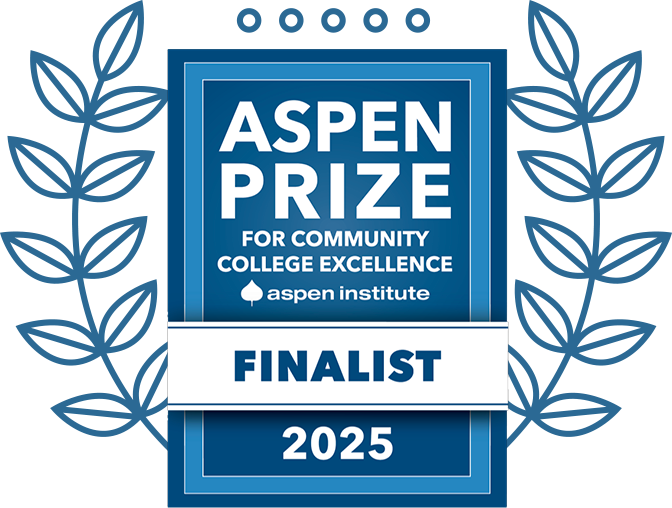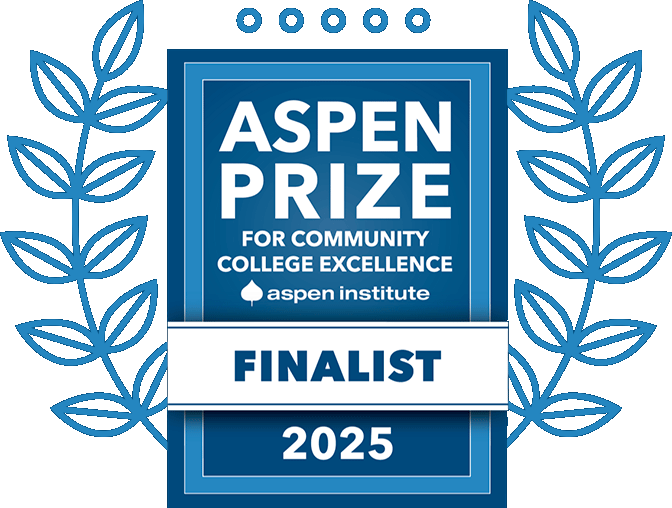Faculty member chosen to study in South Africa
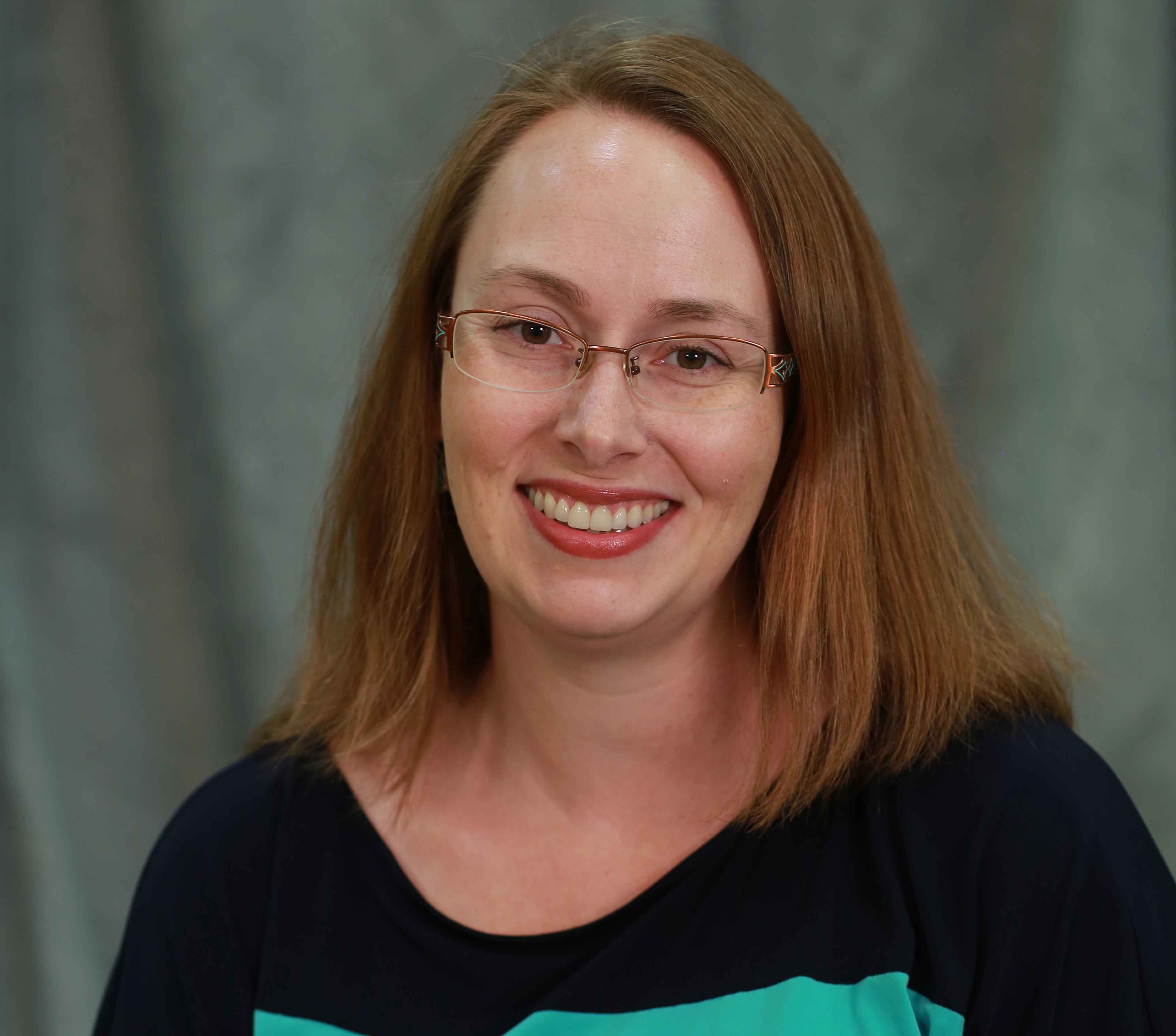
Georgia Highlands College Assistant Professor of Sociology Christina Wolfe has been chosen to take part in the University of South Carolina’s International Perspectives on Higher Education (IPHE) in March. Wolfe will join a group of other college faculty and staff from around the country on a visit to South Africa.
“We will be visiting universities throughout Johannesburg and Cape Town to explore how education has changed in post-Apartheid South Africa,” Wolfe said.
Wolfe stated that the goal of the trip is to discover South Africa’s rich cultural, historic and educational experiences while learning as much as possible about educational transitions at institutions of higher education after Apartheid.
“I love to travel and have never been to the African continent, so I’m very excited about seeing the country,” Wolfe said. “Cape Town is known as one of the most beautiful cities in the world. I’m particularly excited about visiting Robben Island, where Nelson Mandela—along with many other political prisoners—were held during the Apartheid era.”
Wolfe received a competitive scholarship through Centers for International Business Education and Research (CIBER) to help cover expenses for the trip.
Wolfe said the best part of participating in the IPHE program is going to be what she will be able to bring back with her to share with her students at GHC.
“[This trip will] help me bring back experiences to globalize our courses and increase connections in my students’ understanding of how sociological issues are present in their own lives and the lives of others,” Wolfe said. “This program is directly related to my current curricula in ‘Introduction to Sociology’ and ‘Introduction to Social Problems,’ which include discussions of apartheid and its relationship to race, social stratification, power structures in societies and institutionalized discrimination.”
Developing her classes was also a benefit Wolfe noted, saying, “I am particularly interested in the program’s focus on service learning as I seek to implement and improve experiential education for student success in my own courses.”
The group will leave in March. Other locations the IPHE program has traveled to include Spain, France, Italy, Ireland and Costa Rica. Upon returning, all IPHE participants are responsible for completing a follow-up project to implement and share the knowledge gained during the program by developing a short-term study abroad course, engaging in departmental curriculum integration, conducting a presentation on the IPHE outcomes for campus colleagues or by writing a campus news article about IPHE.
Etowah Scholarship Foundation’s sixth annual Reality Store held at GHC
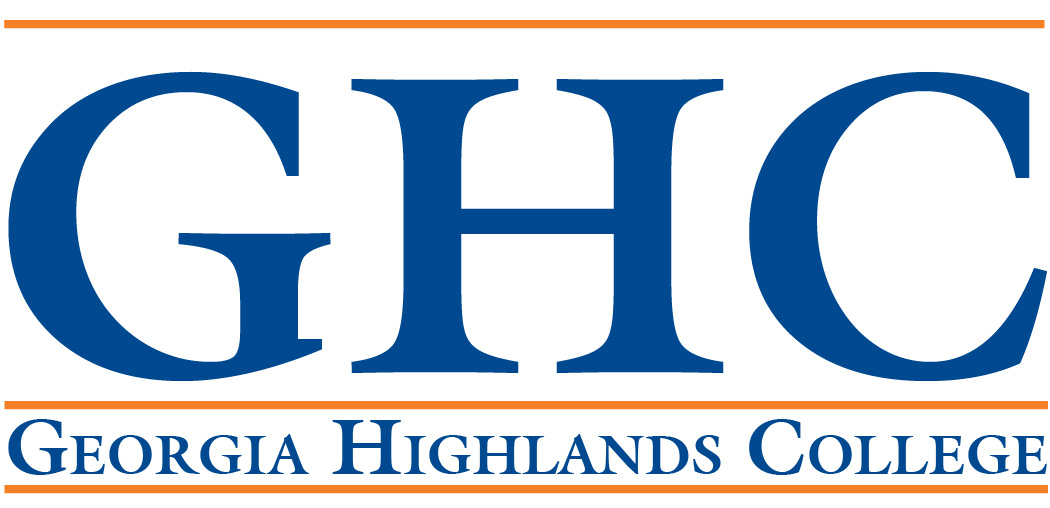
Bartow County freshmen learned a valuable lesson last week — life is expensive when mom and dad are no longer paying the bills.
About 1,300 freshmen from Adairsville, Cartersville, Cass and Woodland high schools — along with freshmen and sophomores from Excel Christian Academy and all high schoolers from Grace Academy — attended the Etowah Scholarship Foundation’s sixth annual Reality Store Friday in the Georgia Highlands College gym in Cartersville to experience what life might be like when they’re in their mid-20s.
Before leaving their school, students were given life situations — occupations, incomes, marital status, children or no children — for a 25-year-old, and at the event, they had to pay their bills for a month.
Salaries had a cap of $7,500 a month — or $90,000 a year — and occupations were limited to careers that could be achieved with four years of college or less; therefore, there were no celebrities and no doctors, lawyers or anyone else who needed more extensive education.
The purpose of the daylong event was to give the teenagers a better understanding of the financial responsibilities that come with adulthood and to show them that the choices they make now will affect their quality of life in the future.
“We try to make it, when you leave mama’s house, you’re going to have to pay your own insurance,” said event Coordinator Brenda Cooper, customer service representative for Century Bank of Georgia in Cartersville. “You’re going to have set up your own student loans [payments], and you’re going to have to have a car. Then you find a place to live, and then you get furniture for it. You’ve got to buy your own groceries and that kind of stuff. And we have life unexpected events. Things pop up — flat tires, washing machine goes out, this kind of stuff, or you may even get a lottery ticket. ... We’re trying to prepare them for what they’re going to see outside in life and make them stop and think now what kind of classes [they need to take to get the career and income they want].”
The process is designed to make students suffer now rather than later, Cooper said.
“Some of them say, ‘Well, we’re having to suffer and go get another job,’” she said. “‘Well, we want you to suffer on paper and not in real life.’ We want them to suffer. I’d rather them suffer here than to get out in the real world and have to go back home to mama or something like that or get two or three jobs like some of them. But we want them to understand that.”
The students visit each of 13 stations in payment order: bank and taxes, student loans, child care, health and life insurance, transportation, housing, groceries, utilities, clothing, furniture, nonprofit, life’s unexpected events (where they randomly drew an event that happens to them) and entertainment. And if they didn’t spend their money correctly, they paid a visit to the out-of-money table to pick up extra jobs.
On the way out, they stopped by for a little guidance from the financial advisers.
At the stations, they had to make such decisions as what type of housing they could afford, what kind of insurance they needed and what kind of car to buy.
Cooper said she encountered a student who had three kids but wanted a Mustang.
“[I said,] ‘You know you have to have a car seat for two of these,’” she said. “‘You’ve got three kids, and you’re going to put all three of them in the back seat of a Mustang?’ See, make them stop and think about their choices.”
Brenda Worley from the Cartersville Woman’s Club saw a lot of surprised teenagers at the student loans table.
“I think some of them are shocked that it costs so much money to go to college,” she said. “When they get a master’s degree, we’re giving them a payment of $470 [a month], which is a chunk, and they are a little shocked. And it’s a 20-year loan so that’s a lot of money.”
But members of the military who found out they didn’t have to pay for school were “very pleased about that,” she added.
Karen Boone from Shaw Industries and Clive Smart from the Kiwanis Club of Cartersville helped students maneuver through life’s unexpected events.
“They can be anything from an illness, doctor visit to medication to their dog is sick and [needs] the vet; their washing machine died, car repair,” Boone said.” But then they can also have a positive unexpected life event like a scratch-off ticket or they were willed some money that they weren’t expecting, those type of things. So it’s really kind of just things that you haven’t planned for in a day-to-day budget.”
And the typical comments they heard from students were “Well, I don’t have enough money for that” or “What am I supposed to do now because I can’t pay for that,” she added.
Smart said he saw “not a single student who’s preparing to put money back for their old age.”
“If they don’t start preparing for old age, they’ll spend their old age in poverty,” he said. “I think the kids are quite surprised how expensive it is to live.”
By the time students got to volunteer Amanda Lanham’s station, they had little or no money for entertainment, especially coming from the unexpected events table, and they were “not happy about it,” she said.
“It was hard because they would have a washing machine broke or whatever, and they’d have to repair it or have plumbing problems so they wouldn’t even have enough money to fix that,” she said. “And so then, of course, coming over here, they ain’t gonna have enough for entertainment so they’d either have to go borrow money or just do without. So they were not prepared.”
Lanham added the lessons taught in the Reality Store “really needs to be taught in a curriculum for at least one semester.”
Savannah Edwards from Johnny Mitchell’s Smokehouse saw her share of down-and-out students at the out-of-money table, where they pick up part-time jobs to earn extra income.
“They’re surprised that their occupation and salary didn’t carry them as far as they wanted to go,” she said. “They thought they could splurge on the entertainment packages, Six Flags tickets and all that, so they ended up here, having to get a second job to pay their bills.”
She also offered them some advice on how to avoid working two or three jobs when they get older.
“I tell them they’ve got to make better decisions along the way, cut finances back where they can, don’t splurge on the expensive furniture and all the added extras they don’t need and just stay with it,” she said.
Adairsville High freshman Monica Deloera became well acquainted with the out-of-money table.
The nurse was making $1,785 a month and had to get part-time jobs at least twice.
“Since I’m single, I didn’t have enough money,” she said.
And what did she learn from the event?
“That I need to probably get married and get him to help me pay stuff,” she said.
AHS freshman Vidal Diaz earned $6,607 month working in agricultural food and natural resources.
He said he was able to have money left at the end of the month by “spending the money on the right things.”
“You don’t always have to buy the most expensive things,” he said. “If you do, you wind up being in debt or not having money left over.”
Nicolas Vargas, also from AHS, was a video game designer with a salary of $6,757 a month.
He said he ended up with about $1,000 left “by buying stuff that’s not too expensive.”
Nicolas said he learned that “everything can be expensive, and I have to work for it.”
“It taught me a lot,” he said.
AS SEEN IN THE DAILY TRIBUNE NEWS: http://daily-tribune.com/newsx/item/7233-reality-store-teaches-freshmen-adulthood-is-tough
President Donald Green says college degrees must be affordable
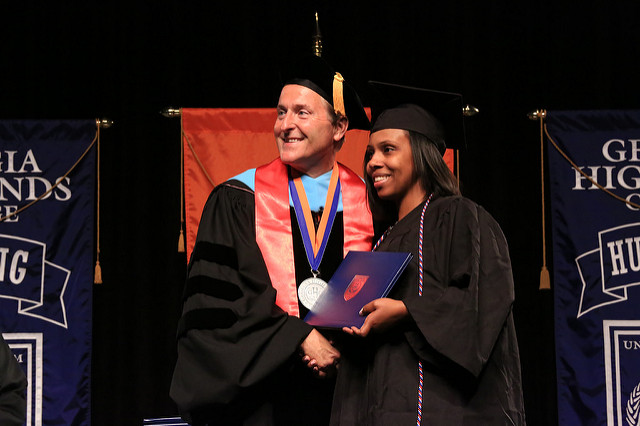
Making a quality, four-year degree program affordable to students across Northwest Georgia is the top priority for Georgia Highlands College President Donald Green.
“If we do not have the workforce, we cannot attract the business opportunities that will fuel our future economic development,” Green said to members of the Rome Rotary Club during Thursday’s meeting.
Green said the need to contain costs for obtaining a degree is critical to GHC.
“Twenty percent of our students who ultimately fail to pay their tuition and continue (their studies) is for a debt of $200 or less,” Green said.
A student can receive a full associate degree at GHC for a total of $7,600 and a four-year bachelor’s degree for $15,400.
GHC offers four-year degrees in nursing, dental hygiene, logistics and healthcare management.
Green said the college is in the process of seeking to add four-year programs in medical laboratory sciences and computer and information systems. The latter program would offer certification in multiple areas of computer technologies.
Green said personal health analysis is becoming a more important part of the healthcare delivery system every day.
“We’re going to need more lab technicians to analyze genetics,” he said.
An initiative to use open-access textbooks — available under open copyright licenses — has saved GHC students just short of $1 million over the last two years. He told the civic group that he chose an e-textbook for his own business law class.
He reminded Rotarians that the University System of Georgia bases its funding formula on enrollment, and usually on a delayed process over of a period of years.
That means that even though enrollment is up this year about 20 percent from three years ago, funding is down about 10 percent because enrollment decreased two and three years ago.
“This is the winter of our discontent,” Green quipped.
The good news: Funding for GHC should increase in the future.
“We still need to increase enrollment and continue (physical) upgrades on the Floyd campus,” Green said. “Floyd deserves more and it needs to get more.”
AS SEEN IN THE ROME NEWS-TRIBUNE: http://www.northwestgeorgianews.com/rome/news/education/ghc-president-donald-green-says-college-degrees-must-be-affordable/article_bab37610-e9d4-11e6-b4af-4b41d70acfa2.html
Advancement team brings home 2016 Overall Institutional Excellence in Advancement award from the Georgia Education Advancement Council
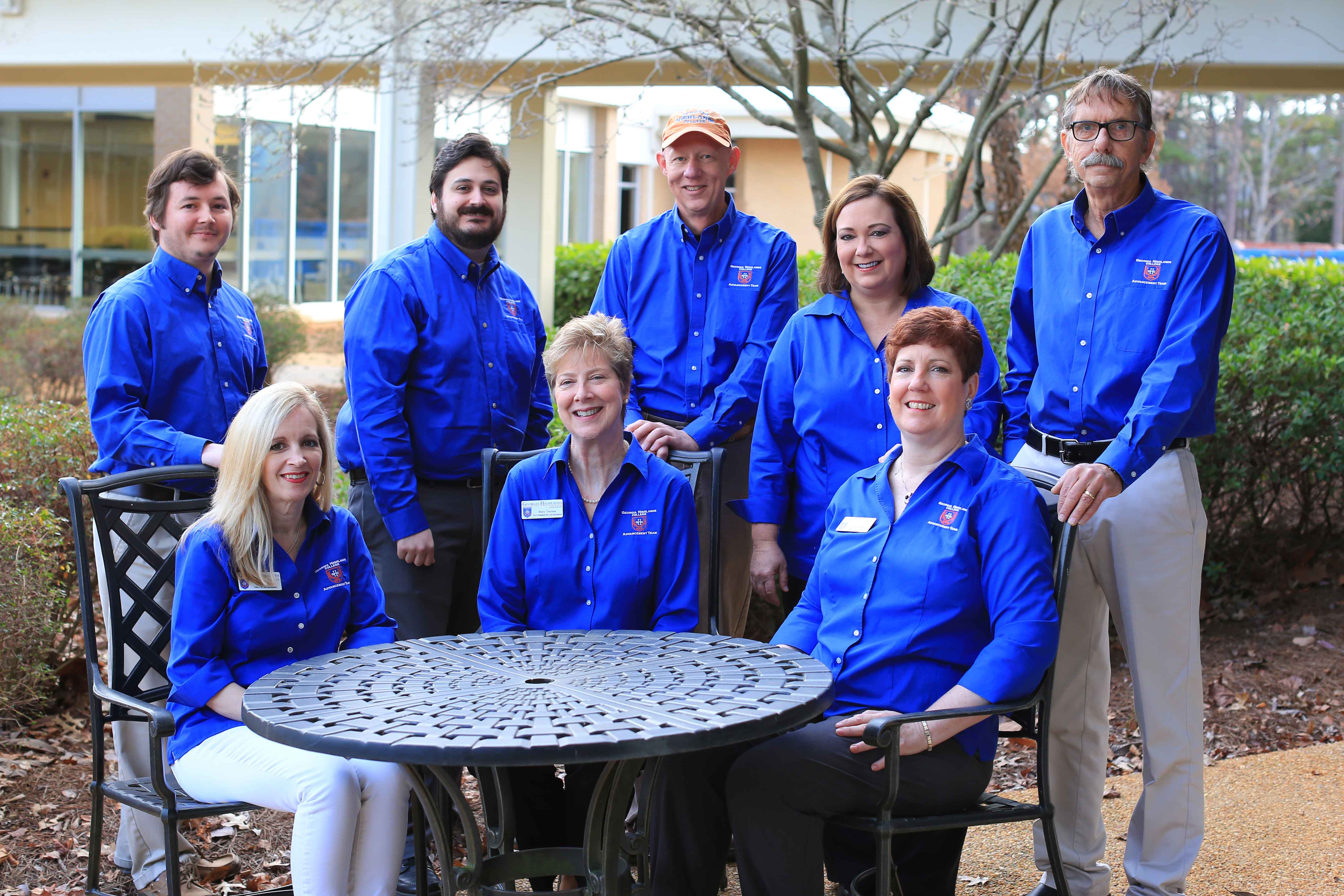
Georgia Highlands College’s Advancement Division recently received the 2016 Overall Institutional Excellence in Advancement award. The annual award is given out by the Georgia Education Advancement Council (GEAC), which selects a winner from all public, private and technical colleges and universities in Georgia each year.
The Overall Institutional Excellence in Advancement award is presented to institutions demonstrating outstanding achievement and commitment to the field of higher education advancement.
Among the accomplishments the Advancement Division was noted for were: an extensive overhaul of GHC’s brand, image and messaging; the revitalization of the Highlander magazine; being a crucial part of the last four consecutive semester enrollment increases; organizing and executing the President’s Inauguration and Presidential Gala; increased funding for scholarships; working to secure approved funding for new construction under the fiscal year 2017 state budget; and much, much more.
“Our Advancement team keeps raising the bar and I am very proud of everything our team has accomplished,” said Mary Transue, Vice President of Advancement. “The creative collaboration our team shows on a daily basis is impressive. We have a very dedicated and talented group of individuals and it is evident by the number of things we have been able to accomplish in one year.”
President Green, who nominated GHC’s Advancement team for the award, echoed Transue by saying he was proud to see GHC bring home the much-deserved award.
“More than ever, GHC’s awareness in our service areas is increasing,” Green said. “GHC is no longer a peripheral topic in the community. It is a part of the conversation. And our Advancement team has a large part to do with that.”
The Georgia Highlands College Advancement team consists of:
Sheila Jones and Nick Godfrey – Marketing & Communications
Jeff Brown and Justin Sucre – Digital Media
Ken Davis – Print & Design Services
Alison Lampkin – Alumni & Special Events
Cindy Gomez – Executive Assistant & Foundation Accountant
Mary Transue – Vice President of Advancement
Five Kids and College: Husband and wife tackle college, work, and kids all at the same time
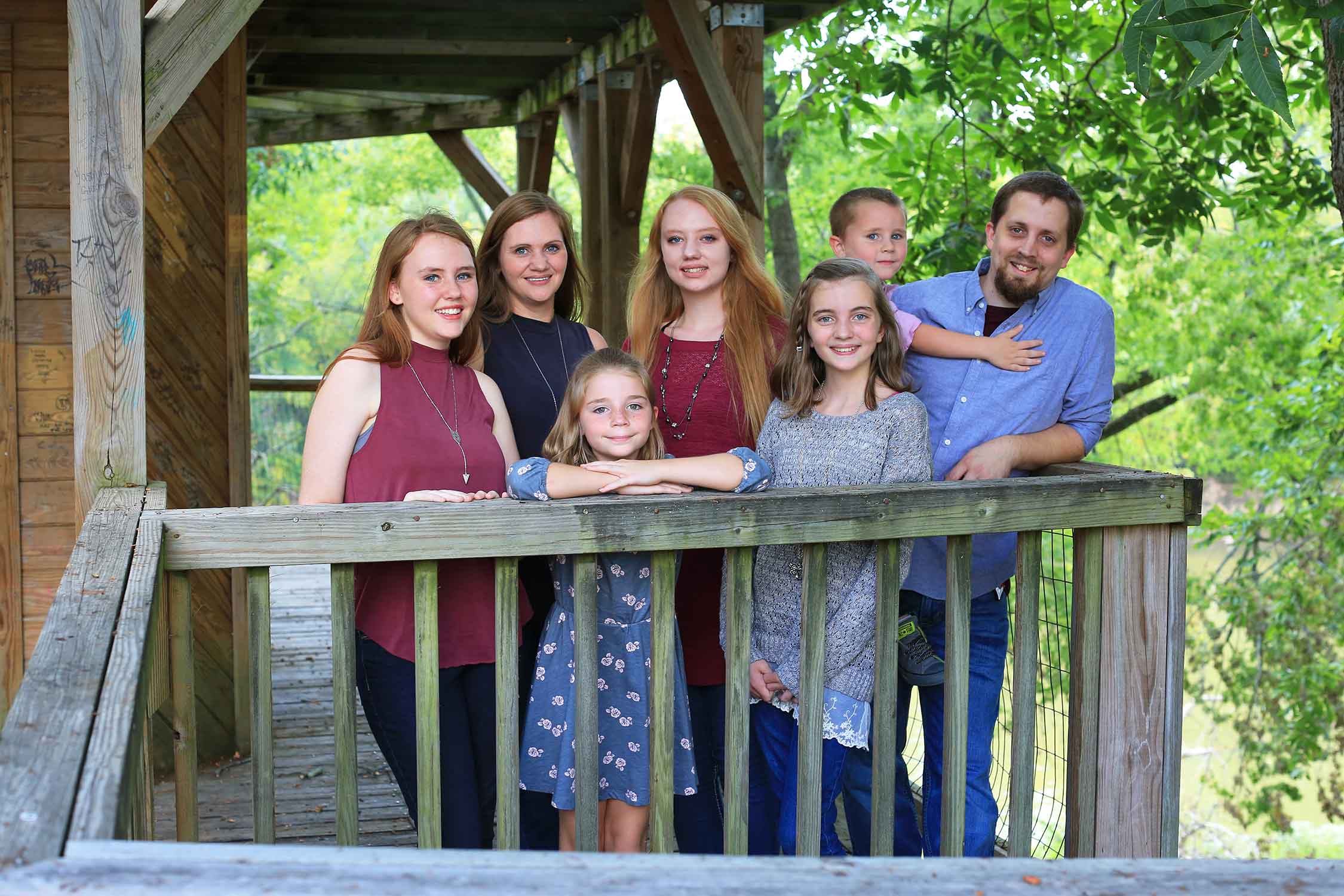
There’s a new family sitcom at Georgia Highlands College called “Five Kids and College.” It stars a family of seven in all levels of schooling, from mom and dad in college to five kids ranging from pre-k to high school…
Sounds like the perfect television show pitch, right?
Well, stay tuned, because this isn’t a show—this is Erich and Miranda Curtis’ life!
The husband and wife team are no strangers to a little adventure.
Since they married 13 years ago, the two have lived in Tennessee, Alabama, California and now Georgia. They once even packed their little family car up with everything they owned and moved to Los Angelas on a whim. And now they’ve decided college is next on their bucket list.
Miranda and Erich are both in their mid-thirties with five kids: Erika is 16-years-old and a junior in high school; Emily is 14-years-old and a freshman; Sophia is 12-years-old and in the seventh grade; Savannah is 9-years-old and in the fourth grade; and Link is 4-years-old and in preschool.
“Who the heck goes back to college with all that on their plate?” you might ask.
Erich and Miranda made it clear from the start of their relationship: follow their dreams and stay happy.
Their motto is “never settle.”
Erich is currently pursuing a business degree and Miranda is working on her education degree.
“I had reservations about taking time away from my kids,” Miranda said, “but it has only brought us all closer. My oldest daughter tries to take similar high school courses as my college ones, because she knows that I can help her. We all get excited about good grades for any of us.”
Miranda went on, “We find it easier to empathize with the stress and struggles the kids are going through now that we are back in school. It is easy to forget how difficult classes can be when you have been away from it for so long.”
But it’s not all rosy. This is one hard working family.
“Our life is hectic, often stressful… There is never a dull moment,” Miranda said. “Our kids are very supportive in our decision to return to school. They help us study as we do them. We have a very busy schedule with it all. The kids play soccer, volleyball, are in the beta club, chorus, band, student council, FBLA, etc. Erich works in management at Toys R Us full time with an hour-and-a-half commute. I work from home. Yet, we somehow still find time to spend together.”
Miranda admits it’s a constant juggle and they are always bouncing from one “last minute thing” to the next trying to get it all done.
“We truly believe this is the right thing for our family. We think it is important to teach our kids they can always improve life, no matter what age. That it is never too late to make a positive change,” Miranda said. “I think that the hardest part for someone considering returning to school is the first step. You have to just go for it.”
Erich and Miranda said they are glad they are making this effort at GHC.
“GHC is very close to our home and is very affordable,” Miranda said. “Upon attending, we have really grown to love it. The professors have been amazing and we really feel at home, even though we are not your average students. It can be hard at times, but it seems most things worth something are.”
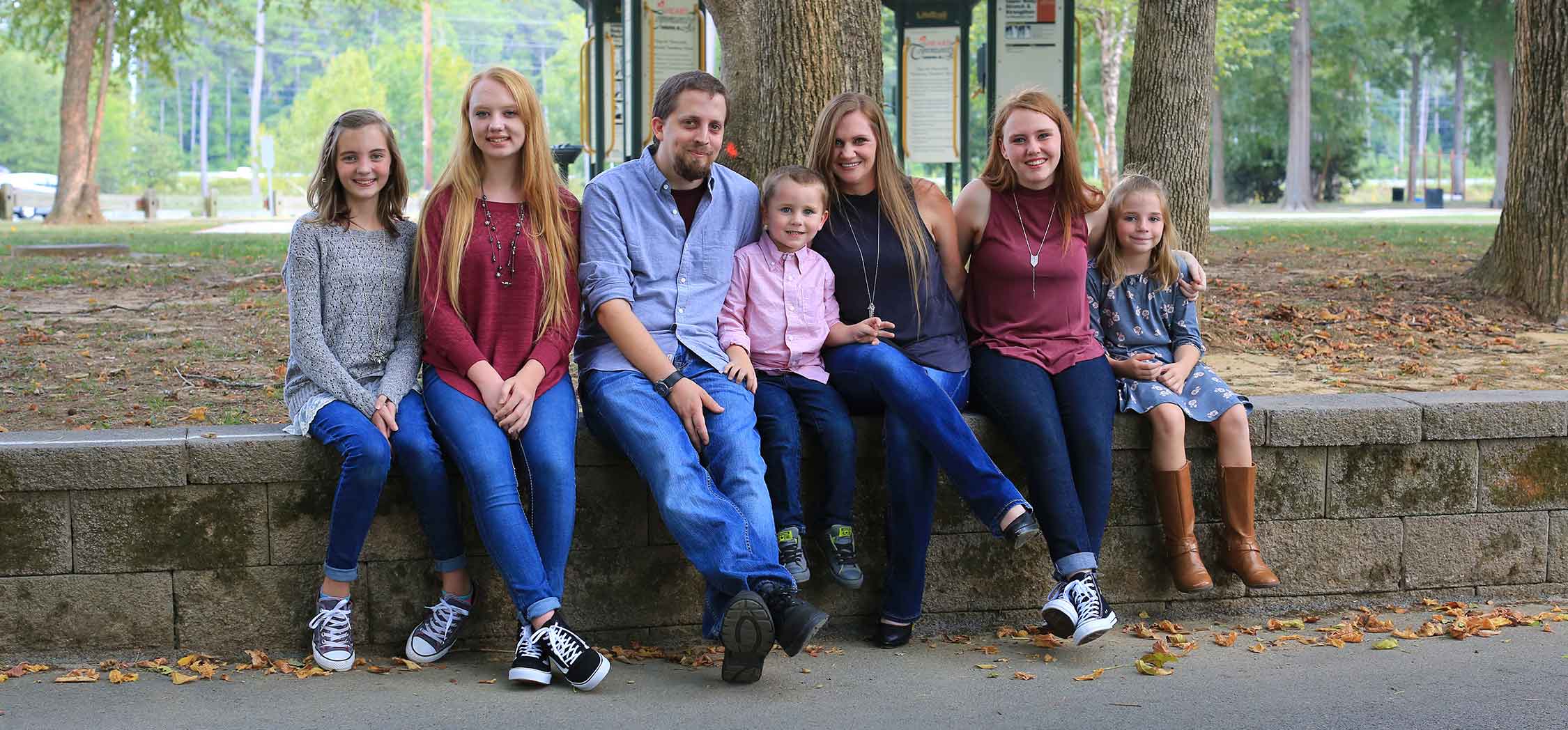
GHC sees three awarded the Heart of the Community for 2017

Nine local ”unsung heroes” Heritage First Bank, David Mathis, Joe Montgomery, Jim Powell, Pamela Roberts, Kristen Sheeley, Mary Hardin Thornton, Tashia Ingram Twyman and Board of Governor’s Honoree, Dr. Richard Dixon have been selected as the recipients of the 2017 Heart of the Community Awards of Honor.
Three of those awarded are affiliated with GHC.
David Mathis serves as the assistant director of athletics. Tashia Twyman teaches FCST at GHC. Mary Harden Thornton has been an annual volunteer for Foundation Camp since the camp was formed.
The nine honorees will be recognized on Feb. 18, 2017 at the 31st annual “Affair of the Heart.” The theme for this year is again “Loving Hearts, Helping Hands.” These awards are sponsored each year by Redmond Regional Medical Center and produced by the Heart of the Community Board of Governors.
A 1976 graduate of Pepperell High School, David Mathis attend Floyd College (now Georgia Highlands College). He currently serves as Program Manager/Assistant Athletic Director at Georgia Highlands College.
His community services activities have included:
– Floyd Parks and Recreation Board
– Foundation Camp at Georgia Highland College
– NAIA National Football Host committee
– Tournament director Georgia Highs School Association
– Floyd Schools business Partner of the Year
– Recreation Authority Horace Anthony Award
– Georgia Highlands college alumni Award
– Organization Advisor of the Year
– Georgia Highlands Staff Community Involvement Award
– Georgia Highlands President’s Meritorious Award
– Served on Floyd Land Bank Authority
– Restoration Lindale Board of Directors
During his tenure on the Authority board, he was instrumental in the transition of Rome Floyd Parks and Recreation form an authority to county control.
Each year he secures funds for the Foundation Camp which was created with a partnership with Georgia Highlands and 100 Black Men of Rome-Northwest Georgia. The camp serves boys 10-16 years of age and serves those who are considered “at risk.” Many of those who have participated return each year and go on to attend Georgia Highlands College.
Through his efforts as Tournament Director of the Georgia High School Association the college raised $200,000 for scholarships to non-traditional students at GHC.
David is married to Kathy Mathis and they have three children, Brooks, Ryan and Rachel.
One of the many who nominated David said of him “If David had his way, we would have never known about his good deeds and would never have brought them to your attention. By accident or otherwise, we must celebrate the excellence that David stands for and delivers ease.”
Tashia Twyman received a Bachelor of Arts Degree from Georgia State University and a Master’s of Education Degree from Jacksonville, State University.
She has served as an instructor and tutor at several colleges and schools in the area.
Her community service does or has included the following:
– Darlington School Strategic Planning
– Community Kitchen Volunteer
– Open Door Home Board
– Rome Housing Authority
– Junior Service League
– Lovejoy Baptist Church
– Alpha Kapa Alpha Sorority
– Rome Housing Authority
Daughter of Rev. & Mrs. Carey N. Ingram, she is married to Christopher P. Twyman and they have two children, Lauren Christa (11) and Myles Christopher (8).
Tashia was nominated by Rhonda Wallace, who says “Tashia’s love for her community shows in her smile. She always goes the extra mile to make an event successful. She always shows up “Ready to Go.”
Mary Hardin Thornton graduated from West Rome High School in 1987 and from Huntington College in Montgomery, Alabama. She received a B.S. Degree in English, Religion and Philosophy.
She currently serves as the Director of Keep Rome Floyd Beautiful where she works to engage the citizen of Rome and Floyd County to take greater responsibility for improving community environment by preventing litter, reducing waste and becoming more involved in community improvement projects.
Her civic and community activities have included:
– Clean Community Commission
– St. Mary’s Catholic Church
– Rome Rotary Club
– Hospitality House for Women Board
– Georgia Arbor Organization
– Director of Neighborhood Sustainability
– Georgia Urban Forest Council
– Paradise Garden Foundation
– South Rome Community Garden
– Network Day Services Board
– Coosa District Civic Service, Boy Scouts of America
– Heart of the Community Foundation Board
– Junior Service League
– Leadership Rome
– TRED ( Trails for Recreation and Economic Development)
She and her husband, Billy, have been married 20 years and have two sons, Wyatt and Henry who attend St. Mary’s School.
Her nominators are quick to indicate her infectious enthusiasm and the service she gives to this community.
AS SEEN IN THE ROME NEWS-TRIBUNE (AND TO SEE FULL LIST AND STORY): http://www.northwestgeorgianews.com/rome/lifestyles/local/heart-of-the-community/article_f6128598-d9c1-11e6-99f1-8f9bca41e340.html
Student takes Top Ten spot at USA Cycling Collegiate National Championship in downhill bike racing
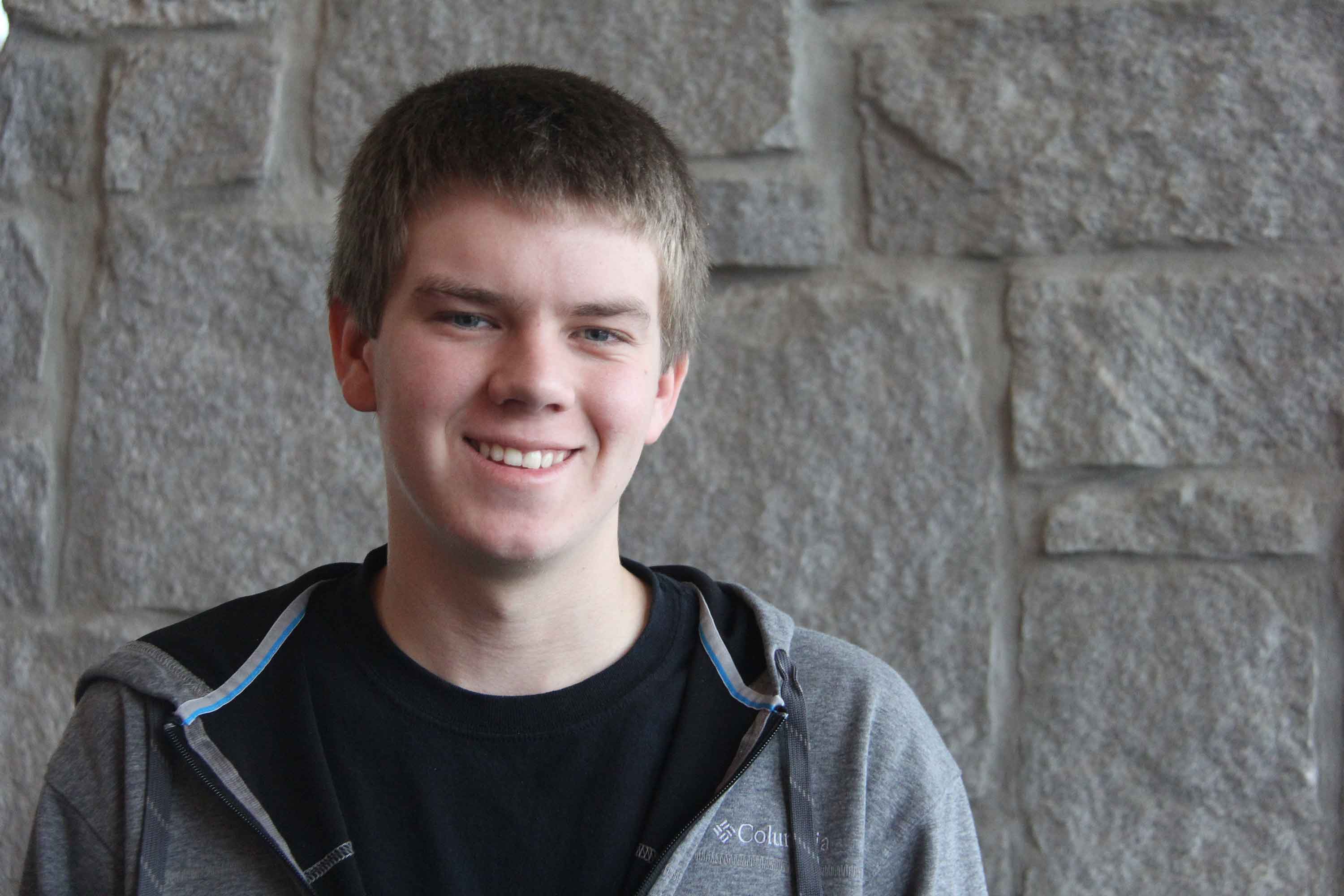
Owen Witcher readies himself on the face of Snowshoe Mountain in West Virginia. He is 4,848 feet above sea level. On a bike. Looking down 1,500 vertical feet of descent. His bike rolls into position. He kicks off. It’s 42 miles per hour straight down. And in five minutes, he’ll be named one of the top ten racers at the USA Cycling Collegiate National Championship.
“I’ve known about this race for two years,” Witcher said. “I knew last year I wanted to get into it this year. I’m turning pro this year.”
Witcher thought the experience would help him in his transition to professional racing. What he didn’t know was he would beat out over 100 other racers from across the country.
Witcher started the Georgia Highlands Cycling club at GHC. He was the only one from the student organization to compete in the USA Cycling Collegiate Mountain Bike National Championship in West Virginia. The competition notes that Snowshoe Mountain is considered to have some of the best trails for top-tier mountain bike racing.
Participating in such an extreme sport may seem scary to some, but to Witcher, he feels right at home.
“I have been racing BMX since I was seven. I did that for eight years before I started mountain biking,” he said. “Then I got into downhill racing about five years ago.”
The speeds and intense terrain require a bike with a lot of suspension, Witcher explained. But, he added, it takes a lot of mental preparation and physical endurance if you want to train yourself to go faster and win.
“The downhill bike has a bunch of suspension to soak up the bumps,” he said, “but some drops can be as high as eight feet to flat.”
Witcher said he has competed all over the country in the category just below professional, winning and even breaking a few bones along the way. For him, biking is just part of who he is.
“I’ve always loved riding my bike,” he said. “One day when I was a kid I just told my mom, ‘I want to race my bike.’ She found a BMX track close to where we lived and I’ve been doing it ever since.”
Witcher is currently studying to pursue a degree in Geographic Information Systems, so he can potentially one day build trails and scope out mountains for large bike competitions and tournaments.
Witcher is a freshman at GHC and takes classes at the Cartersville site. He said he is happy he chose GHC, noting the affordability and the location close to home.
To see more about students like Witcher at GHC who have exciting stories to tell, please visit https://www.highlands.edu/testimonials/
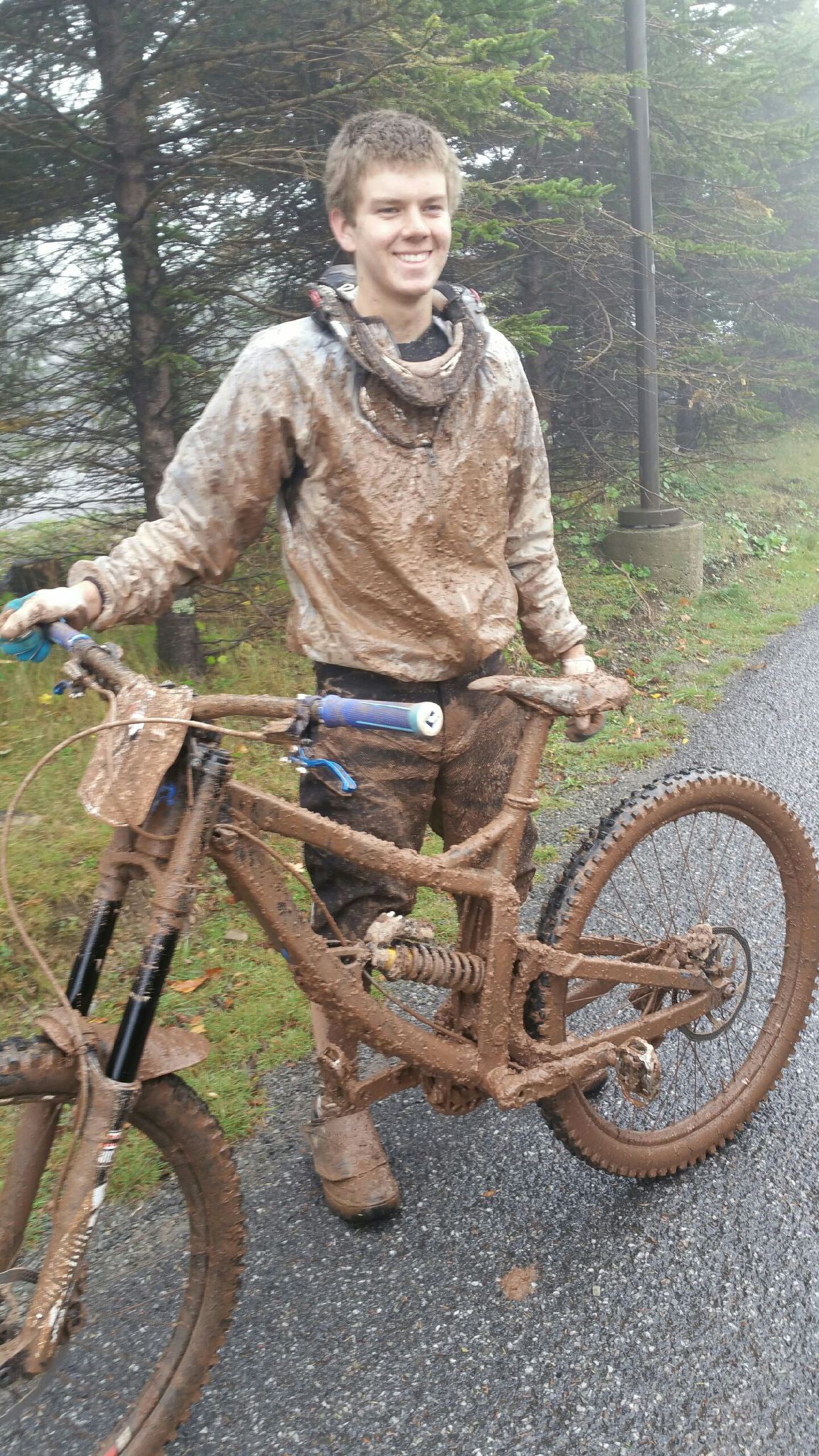
GHC alumna selected to participate in presidential inauguration

She spent her senior year at Cass, graduating in 1992, then earned an associate’s degree from Floyd Community College — now Georgia Highlands College — and a certificate in respiratory therapy from Coosa Valley Technical College.
A Cass High graduate is about to take part in an event that she believes will be the highlight of her military career.
Coast Guard Lt. Cmdr. Tracy Funck of Cartersville was chosen to be part of the Joint Task Force — National Capital Region for the 58th Presidential Inauguration in Washington, D.C., in two weeks.
The task force, which includes members from all branches of the U.S. armed forces as well as Reserves and National Guard, is charged with coordinating all military ceremonial support and Defense Support of Civil Authorities for the inauguration of President-elect Donald Trump Friday, Jan. 20, at noon.
Funck, 43, said she is “very honored to be a part of this event,” which is the first presidential inauguration she’s participated in during her 19-year military career.
“It’s going to be a once-in-a-lifetime experience for me,” she said. “I felt extremely — flattered is probably the best word to describe it. I was very excited, honored. ... It’s going to be kind of like the pinnacle to my career. I’m retiring next year, next April of 2018, and so this is really a high note for me to go out on.”
As a military assistant, Funck’s specific duties for the inaugural festivities “aren’t quite clear at the moment,” she said.
“I’m coined as a military assistant, and what I’ve been told so far is that we will be providing escorts to some inaugural participants, mainly those who don’t want Secret Service protection,” she said. “So each military assistant will be paired with a driver, and we will be assigned to an inaugural participant, who is unknown to me at this time, and we’ll be charged with providing them escort to and from their own place of lodging and to whatever event that they might be attending and then maybe provide some logistical support once they arrive to that event — that they get there and know where they’re going and what they’re doing.”
To become part of the task force, Funck said she had to volunteer for it then be interviewed and vetted by a panel made up of two officers and one civilian.
“They typically want people who are located in the D.C. area, and I happen to be stationed in D.C. at Coast Guard headquarters so I was able to easily volunteer for this event,” she said.
While she was interviewed in September, Funck said she wasn’t notified until the week of Thanksgiving that she’d been selected.
“They had to process, I think it was, a couple of hundred applications and do that many in-person interviews with everybody who had volunteered so it took a little time for them to go through all that and make their final selection,” she said.
The assignment covers more than just the Inauguration Day activities.
“I’m actually starting training today [Wednesday], and it looks like it’s going to extend probably through at least the 24th or 25th of January,” Funck said.
But the preparation is already underway.
“We’ve already attended several orientations,” she said, noting she also has to get her uniforms ready. “A couple of weeks ago, back in December, we attended a big walk-through of the whole entire event. We had this large map at the Armory National Guard, and they walked ... participants through everything that was supposed to happen for several days prior to the inauguration leading up to the day of the inauguration and then a couple of days post-inauguration. They’ve been stepping us through where things will be taking place — the things that are known at this time — and what our goal would be in that.”
Military personnel have participated in this significant American tradition since April 30, 1789, when members of the U.S. Army and local militia units as well as Revolutionary War veterans escorted President George Washington to his first inauguration ceremony at Federal Hall in New York City, according to the Defense Video Imagery Distribution System website.
Armed forces inauguration participation, which demonstrates the military’s support of the country’s new commander in chief, traditionally has included marching bands, color guards, salute batteries and honor cordons, the website said.
“Supporting the peaceful transition of government after a presidential election is a historic event and one that many countries do not have,” Col. Jason Garkey, regimental commander of the 3rd U.S. Infantry Regiment (The Old Guard), said on the website. “I have participated in two previous inaugurations — [Bill] Clinton, 1997 and [George W.] Bush, 2005 — and they both highlighted the unique characteristics of our government and how it brings the nation together.”
Funck, who provides information technology support to all Coast Guard operational and support personnel, said she attended three high schools before her dad, an Air Force officer, retired in 1990 and returned to his and her mother’s native Georgia.
She spent her senior year at Cass, graduating in 1992, then earned an associate’s degree from Floyd Community College — now Georgia Highlands College — and a certificate in respiratory therapy from Coosa Valley Technical College.
“I worked for little while [after college], trying to figure out what I wanted to do with my life,” she said.
Finally, it hit her.
“Something I was always passionate about was serving my country and wanting to be a part of the military,” she said. “It took me some time to get my mother used to the idea. It was early 1997 when I talked to the Coast Guard recruiter for the first time and decided that, that was for me, and that was the avenue that I decided to pursue.”
After getting into the Coast Guard, Funck, who is “single and looking,” returned to school and earned her bachelor’s degree in business administration with a focus on information technology from Old Dominion University in Norfolk, Virginia.
AS SEEN IN THE DAILY TRIBUNE NEWS: http://daily-tribune.com/newsx/item/7029-cass-high-graduate-selected-to-participate-in-presidential-inauguration
GHC student chosen as Board of Regents Academic Day representative
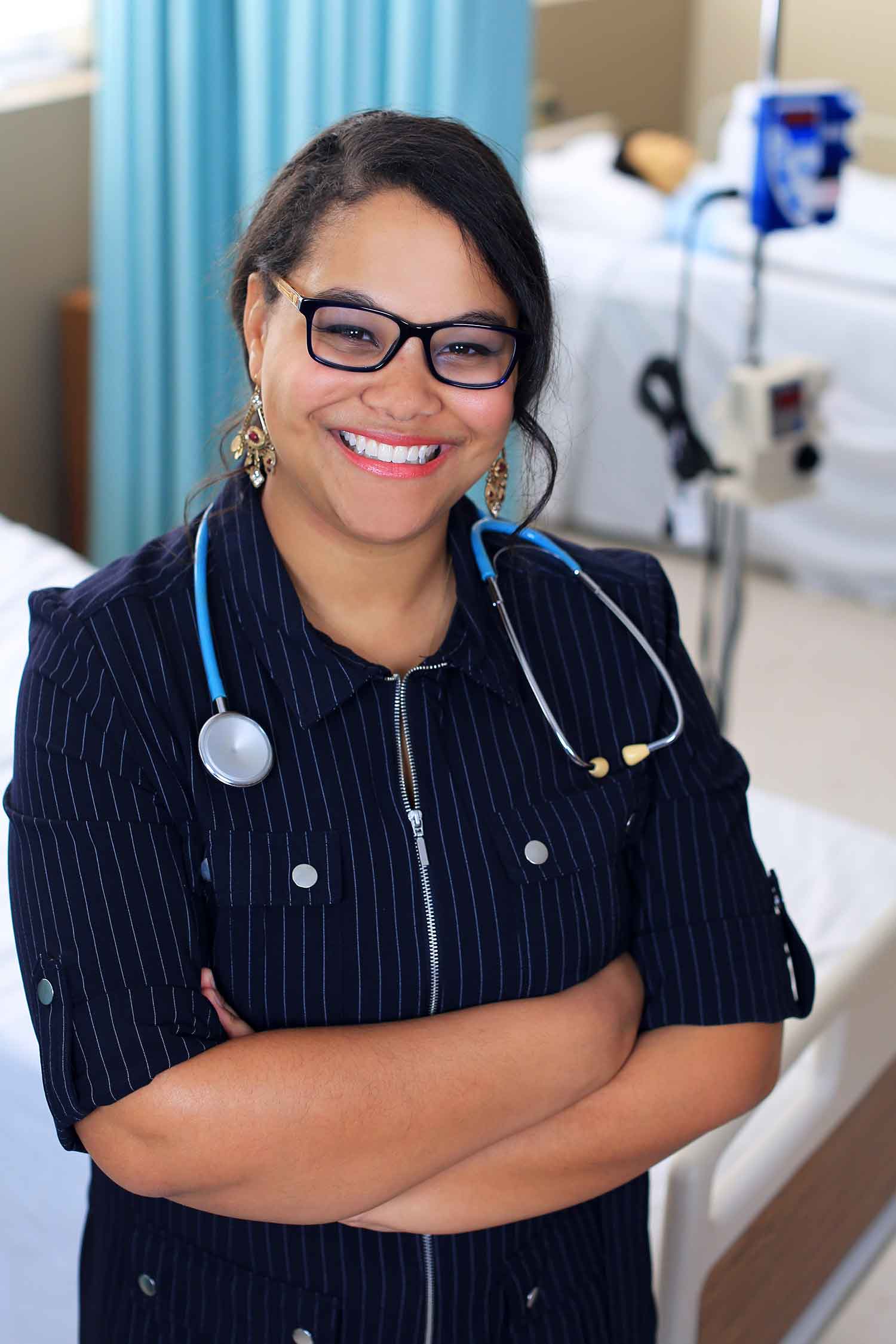
Theresa Arthen has been working full-time while pursing her Associate of Science in Nursing from GHC since 2013. She’ll be the first to tell you it’s not easy. But she’s quick to say, it can be done. And all this comes from a student who holds a perfect 4.0 GPA.
One student is chosen from each college in the University System of Georgia each year to be a Board of Regents Academic Day Representative. Arthen was chosen for GHC, due to her outstanding scholastic achievement, as well as holding the mandatory 4.0 GPA.
Arthen’s drive to succeed comes from her family—and more specifically from her mom.
“My mother grew up in a small village in Congo and taught me to be grateful for all the opportunities and conveniences this great country has to offer,” she said. “I feel it is a crime to waste time, talent and especially knowledge, when so many throughout the world are not afforded the same education.”
But Arthen doesn’t just excel in the classroom. She also helps as an anatomy tutor for other students at GHC.
“There’s nothing quite like the feeling of helping students navigate the incredible challenging nursing pre-requisites,” she said. “One particular time, I was helping a student understand the exceptionally difficult process of how the kidneys regulate fluids and electrolytes. She felt defeated. But her determination was remarkable. When she finally understood, I watched her eyes light up with excitement as she successfully explained the process to me.”
Her desire to help others is part of her motivation to a be a nurse. Arthen has plans to pursue GHC’s bachelor’s degree in nursing after she has completed her associate. After that, she even has plans to continue her education with a Doctorate in Nursing Practice as a Nurse Anesthetist.
“Anesthesia is an art form in its own right,” she said. “Nobody else in the operating room can do what CRNAs do, and few try because of the tremendous stress of the job. This intensity and high level of critical thinking, combined with the nurse’s compassion and soothing presence needed to calm pre-op patients will constantly challenge me both intellectually and emotionally.”
Arthen stated GHC has been a wonderful experience for her and she is glad and honored to represent the college during the Board of Regents Academic Day.
“GHC has become my second home,” she said. “I have met some wonderful professors and lifelong mentors here.”
Arthen and the other representatives will be honored during a Board of Regents meeting and luncheon at the University System Office. She will be recognized again during GHC’s Honor Night in the spring.
First Latino Literature class at GHC to be offered fall 2017

Georgia Highlands College will be offering its first Latino Literature class for fall 2017. The ENGL 2135 course is potentially one of the first Latino Literature surveys offered on the sophomore level in the University System of Georgia.
Dean of Humanities Jon Hershey stated GHC has had such a good response with its African American Literature course (ENGL 2133) that creating a Latino Literature survey is a great next step toward widening course options at the college.
“There are so many Spanish speaking countries and so much outstanding literature that has originated from these countries that the course will have a tremendous amount of literary work to select from,” Hershey said. “The literature will be offered in English translations, so knowing Spanish will not be a requirement for the course.”
Hershey explained that the course is a survey of Latino literature from the 16th century to the present, including writing from Chicano, Cuban, Puerto Rican and Dominican-American traditions, as well as from other Spanish-speaking countries.
The first class will be taught by English Instructor Jessica Lindberg at the Cartersville site.
“We’ll ask questions like: what does ‘Latino’ mean? How is that different from ‘Hispanic?’ How did native populations and European explorers write about each other during colonization? How are the literary traditions and styles of Mexico different from the literary traditions and styles of Chile? How have all of these voices contributed to the multilayered story of Hispanic culture and identity?” Lindberg said.
The class will read letters by a man called “El Inca,” who was the first man born in the Americas to enter the Western literary canon, as well as stories from the Frontier, some popular poetry from Southwestern newspapers, and poetry by William Carlos Williams, the well-known Modernist poet, and documents by the activist leader, César Chávez.
More contemporary readings will include works by Junot Diaz, who just won the Pulitzer Prize for fiction in 2008, and Judith Ortiz Cofer, who lives in Georgia.
“Studying the literature of any group of people means listening to their stories. When we listen to their stories, we hear their joys, their sorrows, their triumphs, and their tragedies,” Lindberg said. “In each of these, we hear reflections of our own stories. We connect. As the Hispanic population of the United States continues to grow, it makes sense to study the stories that define this rich and historic culture.”
For more information on the course or to apply to GHC, please visit: highlands.edu
The next application deadline is December 15. Spring semester begins on January 7.

